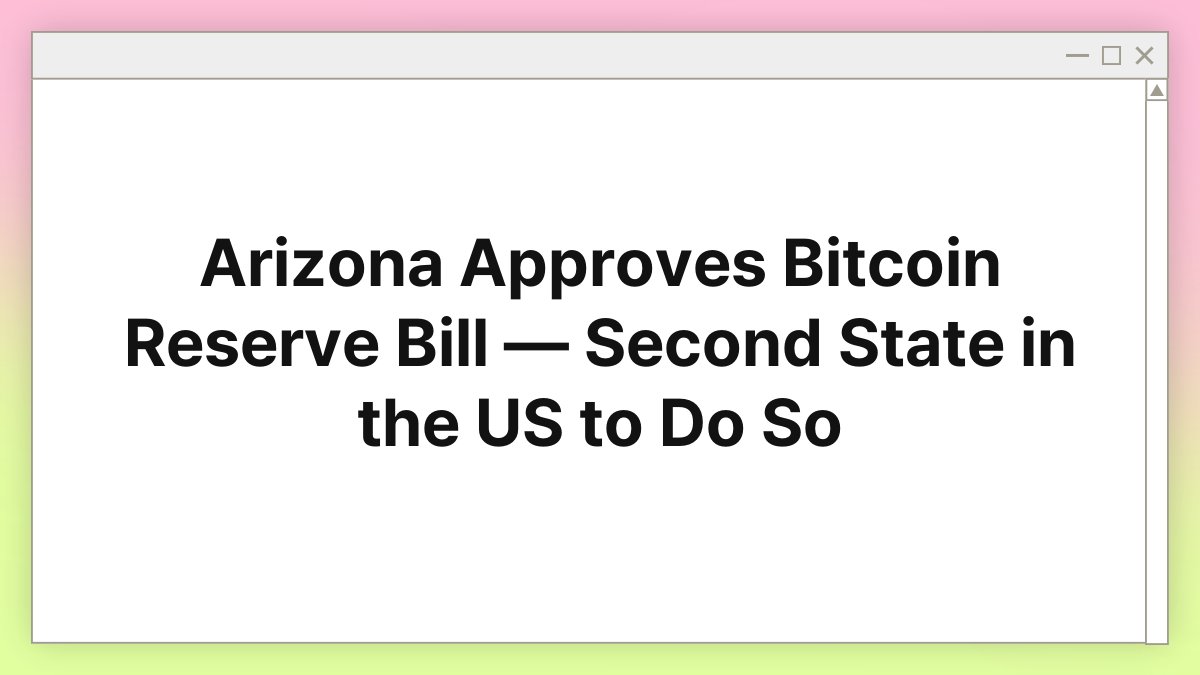[K-Bridge/Samuel] Arizona has recently approved the Bitcoin Reserve Bill, making it the second state in the United States to take such a significant step towards incorporating cryptocurrency into its financial framework.
This legislation allows the state to hold Bitcoin as a reserve asset, a move that reflects the growing acceptance of digital currencies in mainstream finance.
The decision comes amid a broader national conversation about the role of cryptocurrencies in the economy and their potential to reshape traditional financial systems.
As states explore ways to integrate Bitcoin, Arizona’s bold action could serve as a model for others.
This article delves into the implications of this bill, its potential impact on the economy, and the future of cryptocurrency regulation in the United States.
Understanding the Bitcoin Reserve Bill
What is the Bitcoin Reserve Bill?
The Bitcoin Reserve Bill is a legislative measure that permits the state of Arizona to hold Bitcoin as part of its financial reserves.
This means that Arizona can invest in Bitcoin, treating it as a legitimate asset alongside traditional forms of currency.
The bill aims to provide the state with a new avenue for investment and financial growth.
By adopting this measure, Arizona positions itself as a forward-thinking state in the realm of cryptocurrency.
Objectives of the Bill
The primary objective of the Bitcoin Reserve Bill is to diversify the state’s financial assets.
By including Bitcoin in its reserves, Arizona seeks to capitalize on the potential appreciation of cryptocurrency.
This diversification could enhance the state’s financial stability and provide additional revenue streams.
Furthermore, the bill reflects a broader trend of states exploring innovative financial strategies to adapt to a rapidly changing economic landscape.
Legislative Process and Support
The passage of the Bitcoin Reserve Bill involved a thorough legislative process, gaining support from various stakeholders, including cryptocurrency advocates and financial experts.
Lawmakers recognized the importance of embracing technological advancements in finance.
The bill’s approval signifies a shift in how state governments view and interact with digital currencies, paving the way for future legislation in this area.
Economic Implications of the Bill
Potential for Economic Growth
The Bitcoin Reserve Bill could lead to significant economic growth for Arizona.
By investing in Bitcoin, the state may benefit from the cryptocurrency’s volatility and potential for high returns.
This influx of capital could stimulate local economies and create new job opportunities in the tech and finance sectors.
As more businesses and investors flock to Arizona due to its progressive stance on cryptocurrency, the state could see an overall boost in economic activity.
Attracting Cryptocurrency Businesses
Arizona’s approval of the Bitcoin Reserve Bill positions the state as an attractive destination for cryptocurrency businesses.
Companies seeking a favorable regulatory environment may choose to establish their operations in Arizona, leading to increased investment and innovation.
The presence of these businesses can contribute to job creation and economic development, further solidifying Arizona’s reputation as a hub for cryptocurrency.
Risks and Challenges Ahead
While the Bitcoin Reserve Bill presents opportunities, it also carries inherent risks.
The volatility of Bitcoin prices means that the state’s investments could lead to substantial losses.
Additionally, the regulatory landscape surrounding cryptocurrencies is still evolving, which may pose challenges for Arizona as it navigates this new territory.
Policymakers must remain vigilant in monitoring market trends and adapting regulations to mitigate potential risks.
The Role of Cryptocurrency in Financial Systems
Shifting Perspectives on Currency
The approval of the Bitcoin Reserve Bill reflects a broader shift in perspectives regarding currency.
Traditionally, currencies have been viewed as government-issued assets, but cryptocurrencies challenge this notion.
Bitcoin and other digital currencies operate independently of central banks, leading to discussions about the future of money and the role of state authority in financial systems.
Integration with Traditional Financial Systems
As states like Arizona embrace cryptocurrencies, the integration of digital assets with traditional financial systems becomes increasingly feasible.
This integration could lead to innovations in payment processing, banking, and investment strategies.
Financial institutions may need to adapt to accommodate the growing demand for cryptocurrency services, fostering a more inclusive financial ecosystem.
Future of Digital Currency Regulation
The Bitcoin Reserve Bill may set a precedent for future cryptocurrency regulations across the United States.
As more states consider similar measures, a cohesive regulatory framework may emerge, providing clarity for businesses and investors.
Policymakers will need to balance innovation with consumer protection, ensuring that the benefits of cryptocurrencies are realized without compromising financial stability.
The Future of Cryptocurrency in Arizona
Long-term Vision for Bitcoin in Arizona
Arizona’s approval of the Bitcoin Reserve Bill indicates a long-term vision for integrating cryptocurrency into the state’s financial landscape.
As the state continues to explore the potential of digital currencies, it may develop additional policies to support growth in this sector.
This forward-thinking approach could position Arizona as a leader in cryptocurrency adoption and innovation.
Educational Initiatives and Public Awareness
To ensure the successful implementation of the Bitcoin Reserve Bill, educational initiatives will be crucial.
Public awareness campaigns can help residents understand the implications of cryptocurrency and its potential benefits.
By fostering a knowledgeable community, Arizona can create an environment conducive to the growth of cryptocurrency-related businesses and investments.
Collaboration with Financial Institutions
Collaboration between the state government and financial institutions will play a vital role in the success of the Bitcoin Reserve Bill.
By working together, stakeholders can develop best practices for managing cryptocurrency investments and ensuring compliance with regulatory requirements.
This collaboration can enhance the state’s credibility in the cryptocurrency space and attract further investment.
Conclusion
The approval of the Bitcoin Reserve Bill marks a significant milestone for Arizona, positioning the state as a leader in cryptocurrency adoption.
By embracing digital assets, Arizona opens new avenues for economic growth and innovation.
However, the journey ahead will require careful navigation of the risks and challenges associated with cryptocurrencies.
Policymakers must remain proactive in developing regulations that support growth while ensuring financial stability.
Frequently Asked Questions
Q: What does the Bitcoin Reserve Bill entail?
A: The Bitcoin Reserve Bill allows Arizona to hold Bitcoin as part of its financial reserves, enabling the state to invest in cryptocurrency.
Q: How could this bill impact Arizona’s economy?
A: The bill could lead to economic growth by diversifying state assets, attracting cryptocurrency businesses, and creating job opportunities.
Q: What are the risks associated with the Bitcoin Reserve Bill?
A: Risks include the volatility of Bitcoin prices and potential regulatory challenges as the cryptocurrency landscape continues to evolve.
Q: How does this bill reflect changing perspectives on currency?
A: The bill signifies a shift towards recognizing cryptocurrencies as legitimate assets, challenging traditional views of government-issued currency.
Q: What is the future outlook for cryptocurrency in Arizona?
A: The future looks promising, with potential for further integration of cryptocurrency into the financial system and educational initiatives to raise public awareness.








